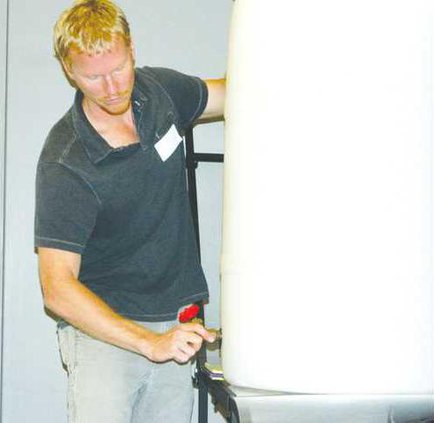Rain Barrel design
For more information about the new rain barrel design, visit www.soque.org or call 706-754-9382. Barrel workshop When: 6:30-7:30 p.m. Oct. 6. Where: Flat Creek Water Reclamation Facility Training Room 2641, Old Flowery Branch Road, Gainesville. More info: 770-532-7462, Jflowers@gainesville.org.
Thanks to a redesigned model, capturing rainwater for use in home gardens has gotten a lot easier and more efficient.
Staff members of the Soque River Watershed Association recently hosted a rain barrel workshop showcasing the new design, which helps to reduce overflow issues when the barrel reaches capacity. The workshop was held at North Georgia Technical College in Clarkesville.
Previous rain barrel models featured an overflow hole that generally allowed excess water to spill onto the ground, which could cause erosion or create standing pools of water. The newly designed rain barrel connects to your home’s rain gutter with a diverter.
"The beauty of this system is that when the barrel fills up, water will be diverted back to your rain gutter," said Justin Ellis, executive director of the nonprofit watershed association based in Habersham County.
Another benefit to this design is that the barrel is completely sealed, so the standing water in the container is no longer a potential breeding habitat for mosquitoes.
The new design also allows home harvesters to detach the barrel and seal the diverter hole in the gutter for the winter months.
Harvested rainwater can be used in outdoor gardens and around your home for non-drinking purposes like flushing toilets and watering plants.
If you think that installing a rain barrel at your home would be a waste of time, Ellis says you should think again.
"You’d be amazed at how much water you can capture," Ellis said during the workshop.
"Say you live in a pretty decent-sized house, say around 2,000 square feet. Just one, 2-inch rainfall on your home drains 2,496 gallons of water.
"For most of you, that’s more water than you use in your home in a month."
Collecting rainwater doesn’t just have an immediate impact on your wallet. There are more long-term affects.
"A huge benefit of rainwater harvesting is pollution prevention. All the water we can capture and use is less stormwater running rapidly down to the rivers and streams when it rains," said Duncan Hughes, watershed coordinator for the North Georgia Technical College-Soque River Watershed Partnership.
"Stormwater is simply rainwater that becomes pollution. When rainwater runs off, it carries with it everything that’s out there — oil, dirt, pollution."
That polluted runoff has the potential to affect the quality of drinking water supplies.
"Every activity within a landscape contributes to the quality of your water. Everything you do in or around your home affects the watershed," Ellis said.
"A watershed isn’t just a river. It’s the land that drains waters to a river, stream or lake."
The newly designed, 55-gallon rain barrels, complete with the installation kit and step-by-step instructions are available for $40 from the Habitat for Humanity Restore in Clarkesville.

